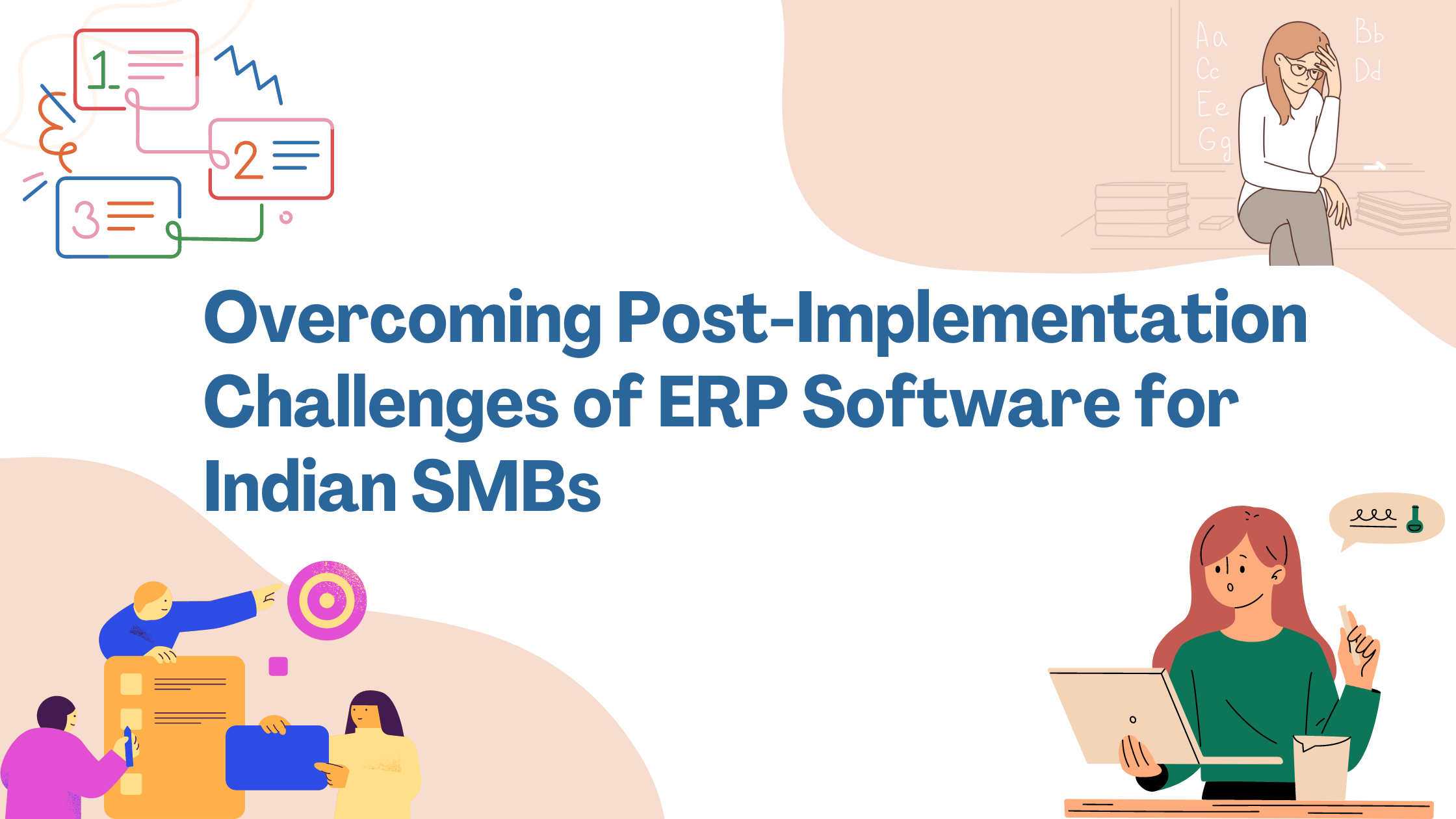Overcoming Post-Implementation Challenges of ERP Software for Indian SMBs
Enterprise Resource Planning (ERP) software has become an essential tool for businesses, offering solutions to manage finance, human resources, supply chain, and customer relations in a unified system. For small and medium businesses (SMBs) in India, implementing ERP software represents a significant investment and promises increased efficiency, better data management, and improved decision-making. However, the journey doesn’t end with implementation. The post-implementation phase brings its own set of challenges that can impact the effectiveness of the system and the return on investment. In this blog, we explore the key challenges faced by SMBs in India after implementing ERP software and offer strategies to address these issues.

- Low User Adoption Rates- Ensuring Effective Utilization: One of the most significant challenges faced by SMBs after implementing ERP software is low user adoption rates. No matter how advanced the ERP system is, its effectiveness hinges on how well employees use it. If employees are reluctant to adopt the system, the organization will struggle to realize the full benefits of its investment.
Low user adoption can lead to data inconsistencies, reduced efficiency, and failure to achieve the expected return on investment. It can also exacerbate other challenges, such as data entry errors and increased dependence on vendor support. - Ongoing Training Needs- Keeping Up with System Evolution: Training doesn’t end with implementation. ERP systems are dynamic, requiring continuous learning to keep up with updates, new features, and changes in functionality. Managing ongoing training needs can be challenging for SMBs, especially with limited resources.
Regular updates and new features require employees to stay informed and proficient. Without continuous training, gaps in knowledge can lead to underutilization and inefficiencies.
High employee turnover means new hires need both role-specific and ERP system training, which requires additional time and resources. - Data Entry Errors- Maintaining Data Integrity: Accurate data is the foundation of any successful ERP system, but data entry errors are a common challenge for SMBs, leading to operational inefficiencies and faulty decision-making.
Errors in data entry can lead to incorrect reports, poor decision-making, and operational issues like stockouts or compliance problems. - Over-Customization Complications- Managing Complexity: While customization can tailor an ERP system to a business’s specific needs, over-customization can introduce significant complications, especially for SMBs.
During the implementation phase, employees may need to divide their time between their regular duties and the ERP project, leading to potential delays in day-to-day operations. This disruption can reduce productivity, cause missed deadlines, and negatively impact customer satisfaction. In highly competitive environments, these disruptions can have serious consequences. - Vendor Dependence- Reducing External Reliance: After implementing an ERP system, many SMBs find themselves heavily dependent on their ERP vendor for ongoing support, updates, and maintenance, which can create several challenges.
Migrating data from existing systems to the new ERP platform is another critical challenge. This process involves not only transferring data but also ensuring it’s clean, accurate, and correctly formatted for the new system. Data migration can be a time-consuming and error-prone process, and mistakes during migration can have long-lasting effects on business operations. - Long Payback Period- Managing Financial Expectations: ERP systems represent a significant investment, and realizing a return on that investment can take longer than expected, leading to financial strain and frustration.
- Change Management Issues- Ensuring Smooth Transitions: Effective change management is crucial to the success of any ERP implementation, both during and after the system goes live. Without proper change management, even the most well-designed ERP system can fail to deliver its intended benefits.
Implementing an ERP system is a significant undertaking, but the challenges do not end once the system goes live. For small and medium businesses in India, the post-implementation phase presents a host of challenges—from low user adoption rates and ongoing training needs to data entry errors, over-customization complications, vendor dependence, long payback periods, and change management issues. Addressing these challenges requires careful planning, continuous support, and a commitment to ongoing improvement. By understanding and proactively managing these challenges, SMBs can maximize the value of their ERP investment and position themselves for long-term success in an increasingly competitive business environment.
